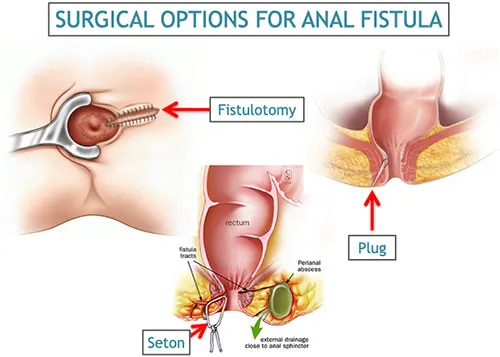A fistula is an abnormal connection between two organs or structures within the body, often forming an abnormal passageway. It can occur in various areas, such as the digestive tract, urinary system, or reproductive organs. Moreover, several types of fistulas can occur in the human body.
Fistula symptoms like pain and discharge of pus and blood may negatively affect your everyday life. Therefore, doctors suggest a fistula surgery procedure to alleviate symptoms, prevent complications, restore normal function, and improve the overall quality of life.
This blog will walk you through the fistula surgery procedure, recovery and aftercare tips.
Types and Symptoms of Fistula
The fistula surgery procedure depends upon the type of fistula you have. Some common types are:
- Anal fistulas
- Urinary tract fistulas
- Gastrointestinal fistulas
- Aortoenteric fistulas
The common symptoms you may experience due to these types of fistula may include:
- Itching
- Discomfort
- Pain with defecation on presentation
- Discharge of pus and blood.
- Abscess
Fistula Surgery Procedure
After thoroughly analysing the type, location, and severity of the fistula, your doctor will advise you of a fistula surgery procedure. The fistula surgery procedure aims to remove the fistula, restore normal anatomical function, and improve overall health.
Some of the most common fistula surgery procedures are fistulotomy, seton surgery, and LIFT (Ligation of Intersphincteric Fistula Tract).
Here is a step-by-step explanation of the most common fistula surgery procedures:
Fistulotomy
- First of all, your doctor will place you under anaesthesia, either general or regional.
- The surgeon identifies the fistula tract through a thorough examination and probing.
- Then they will make an incision along the length of the fistula tract, exposing the entire length of the tract.
- The tract is dissected and removed, removing any infected or damaged tissue.
- Doctors will clean and rinse the wound to prevent infection.
- In some cases, a seton (a surgical thread) is left in the fistula for many weeks to keep the tract open for drainage and helps in healing, also known as seton surgery.
- The wound is left open to heal from the inside out.
- Lastly, the doctor will guide you about postoperative instructions for wound care and pain management.
LIFT (Ligation of Intersphincteric Fistula Tract)
- Firstly, your doctor will place you under anaesthesia, either general or regional.
- The surgeon identifies the internal opening of the fistula tract within the anal canal.
- The surgeon will make a small incision in the perianal region to access the intersphincteric space.
- Then they will dissect and separate the fistula tract from the sphincter muscles.
- The surgeon uses a non-absorbable suture to ligate and close the internal opening.
- Then they will irrigate the wound and remove excess tissue.
- The doctor will guide you about postoperative care after closing the incision.
Fistula Surgery Recovery And Aftercare Tips
After the fistula surgery procedure, your doctor will suggest immediate postoperative care involving pain management, monitoring for infection or bleeding, and following mobility restrictions.
In long-term fistula surgery recovery, you may expect wound healing, dietary modifications, and gradually returning to your routine life. However, regular follow-up appointments will help you monitor progress and address concerns.
Here are some tips for fistula surgery aftercare that are essential for ensuring the success of the fistula surgical procedure:
- You must follow up with the doctor to monitor the healing progress, address concerns, and ensure optimal recovery.
- You should adhere to prescribed medications and treatments to manage pain, prevent infection, and promote healing.
- Good hygiene, such as keeping the surgical area clean and following wound care instructions, will help prevent infections and promote healing.
- You must ensure taking adequate rest during the recovery period. And gradually increasing activity levels, as advised by the doctor, help avoid strain and supports healing.
- Your doctor may advise you to make healthy lifestyle changes like a balanced diet, regular exercise, and managing underlying health conditions. As it contributes to better overall health and aid in the recovery process.
To Sum it Up,
A fistula surgery procedure is necessary when the fistula causes significant symptoms, such as chronic pain, recurrent infections, and impaired organ function. The fistula surgical procedure depends on the type and severity of the fistula. The healing rate may vary from patient to patient. By following up with the doctor and making the advised changes to your life after the surgery you can ensure the success of your fistula surgical procedure.
Making Informed Choices for Fistula Surgery Centers
When considering treatment options for fistulas, your doctor may recommend minimally invasive surgeries, which provide significant advantages. These procedures offer shorter recovery periods, reduced pain after surgery, minimal scarring, and a faster return to your routine life. By opting for these less invasive techniques at the appropriate time, you can improve your overall experience, enhance your quality of life, and ensure the best outcome. It’s crucial to follow your doctor’s advice and consult with expert professionals for optimal results.
Unlock a life of freedom and renewed wellness with Smiles Institute of Gastroenterology LLP! Our expert team of experts is passionately dedicated to empowering individuals by providing the best treatment and cutting-edge surgical solutions for piles, fistula, fissures, and other GI disorders.
Don’t hold back any longer—experience the transformative power of timely intervention and embark on a journey towards renewed health and happiness with Smiles Institute of Gastroenterology LLP!” Call 8099008800 to book an appointment or visit: www.gastroenterology.smileshospitals.com

